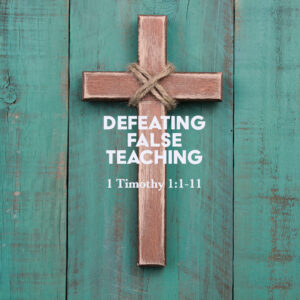1 Timothy 1:1-11: Defeating False Teaching
August 1, 2023
TODAY'S BIBLE READING:
Ezra 1-2, Proverbs 1, Luke 13:1-9, 1 Timothy 1:1-11

In this (and its companion letter 2 Timothy), Paul is writing to the young Timothy to give him specific instructions regarding how to shepherd the church under his care in the great ancient city of Ephesus. In particular, Timothy will need to correct the false teachers and their false teaching that had arisen in that city and among that church. Probably fulfilling Paul’s prediction in Acts (Acts 20:29-30) that after his departure “fierce wolves” would arise, it was now Timothy’s job to shepherd this flock and protect the sheep. But how was he to do it?
Well the first task if one is to correct false teaching is to become crystal clear as to why that teaching is indeed false. If there was nothing remotely attractive – or apparently true – about the false teaching, then presumably it would not be a problem. Most false teaching is not patently or absurdly false; it is subtly false, and indeed can be magnetic to the unwary conscience of the untutored Christian. So what was wrong about this false teaching?
The false teaching was emphasizing myths and genealogies. This does not perhaps seem particularly attractive to us! But it may well have been playing off a charismatic connection between traditional Jewish thought (“genealogies”) and the new-fangled mystery religions that were seeping into the Roman world at the time from the East (“myths”). We don’t know for sure – but at any rate, the teaching was characterized by these “controversial speculations.” This is often the case with false teaching: it tends to create endless debates. The truth has an organic wholeness to it. There is an integration to it because there is inherent integrity to the truth. But lies and falsehood don’t naturally cohere; they naturally fall apart, and you have to glue them together with further lies. This dynamic tends, therefore, to create controversies as these contradictory ideas are discussed.
The other part of this particular false teaching was a misuse of the law. There is a right use of the law – to lead us by conviction of sin to put our faith in Christ, and the use of the moral law to guide our faith towards obedience to Christ. But there are multiple wrong uses of the law, and when misused, the law tends to devolve into some sort of legalism. Legalism is the idea that we must keep the law to please God, and that therefore spiritual maturity and growth in holiness can only come about through more rules, regulations, and human disciplines.
So this is what was wrong with the false teaching: myths or mysticism, genealogies or fascination with Jewish tradition, and a wrong use of the law that was leading to legalism in faith and practice. In short, the Christians at Ephesus were being tempted away from the sufficiency of Christ for faith and practice, towards the necessity of either mystical experience or regulations and rules. To put this into contemporary terms, imagine a false teacher saying something like the following. “Yes, of course it is good to put your faith in Christ. But that sort of thing is just the beginning. To really be a mature and special Christian, you need to follow my particular set of human rules or disciplines. And as you do that, you will get a new insight into your personal spiritual experience of God.” When we put it like that, we can probably think of any number of “religious rules and rituals” that are around today which lead the unwary conscience of the untutored Christian away from the sufficiency of Christ.
What is the answer to this kind of false teaching? Paul will describe that throughout these two letters to Timothy. But here at the beginning – as he describes this false teaching – he embeds two key principles. First, God’s work advances by faith (the end of verse 4). Counterintuitively, the way to advance the work of God is through faith in God. This is the lesson of the whole Bible, but it is a lesson that constantly needs to be retaught and relearnt and reemphasized.
Second, the way to grow in godliness and Christlikeness, and defeat immorality and sin in the life of the Christian, is through a right application of and trust in and working out of the gospel (the end of verse 10 and verse 11). Again, counterintuitively, the way for someone to grow in Christlikeness is not just to add more rules and legislation to their life. No, it is to realize anew how much we owe to Christ, what glory awaits those who trust in Christ and the reward for those who follow the gospel in their own lives through the sound doctrine that conforms to the gospel of the glory of the blessed God.
ABOUT THE AUTHOR
Josh Moody (Ph.D., University of Cambridge) is the senior pastor of College Church in Wheaton, IL., president and founder of God Centered Life Ministries, and author of several books including How the Bible Can Change Your Life and John 1-12 For You.
WANT MORE?
To receive God Centered Life devotionals directly in your inbox, as well as other resources, enter your email address in the form at the bottom of this page and click "subscribe."

